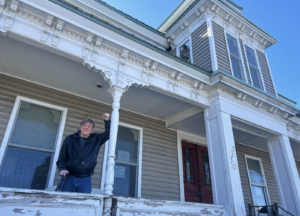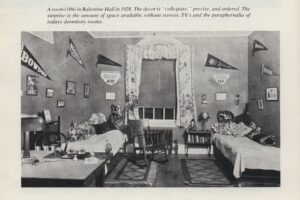Applications are being accepted for a three-week service trip to northern Ghana to help villages get access to clean water and solar charging centers.
Students volunteer through a non-profit called Saha Global, founded by Kate Clopeck and Vanessa Green in 2008. When the two met in graduate school at Massachusetts Institute of Technology for International Development, they dreamed of leaving a lasting impact on communities. Clopeck explained that many organizations have good intentions but don’t leave a sustainable lasting impact.
Since the start of Saha Global, 300 students from universities all over the world have volunteered on service trips to Ghana. Saha Global does two trips per year, one over winter break from December to January, and one in June. The students apply to work on either a clean water project or a solar project.
Many students want to get international development experience, or to simply travel out of the country. Andrew Purgiel, a third-year chemical engineering student from the University of Maine, went in summer of 2015.
“I didn’t have an internship for the summer or anything. I felt it would be good to check this out. I want after college to do something meaningful for work,” Purgiel said.
Now, Purgiel is trying to spread the word to other students who might be interested.
“If you don’t have experience don’t let that deter you. It is a good starting point. It will help you see if you want to do development work, and you get to meet students from all over the country,” Purgiel said.
Caroline Hettermann, a 2015 graduate of UMaine, went on the trip over winter break during her junior year. She explained that she had been to Europe before, but never to a less developed country.
“I have to say, out of all the places I have been, Ghana is still my favorite by far,” Hettermann said.
Every day for the three-week service period, students break off into groups of four and travel to assigned villages to work on their projects. Clopeck explained that students are never paired in groups with students from their same university. The first day students meet with the chief and elders of the village, and then propose their plan to the village, whether it is to treat contaminated drinking water, or make solar charging stations for cell phones.
Students then teach women of the communities how to become entrepreneurs of the businesses. The women will sell clean drinking water, or charge villagers fees to use the solar charging stations, but all the revenue will be kept in the community. Nothing goes to Saha Global.
“We are really focused on women’s empowerment and enabling people living in these communities to take advantage of the resources they have,” Clopeck said.
Since the beginning, Saha Global and student volunteers have started 78 water businesses and 15 solar businesses. The solar businesses just started two years ago. Clopeck said that they were particularly proud that they have provided jobs for 191 women. All of their businesses are still in operation today, and Saha Global frequently posts online to update past volunteers on their past villages.
“Our students really feel like they were the ones that totally did everything in that community, and they were the ones who were responsible for changing the lives of everyone who lived there,” Clopeck said.
Clopeck added that through the program, students gain project management, communication and networking skills. The organization has a significant alumni network of people who all care about similar issues.
Hettermann has always been passionate about the water crisis and what she can do to help.
“I think that it is important that everyone get educated on the water crisis, because while it is not directly affecting us right now, I think in the future it will if we are not cautious about it.” Hettermann said.
Purgiel said the biggest challenges for him were the language and cultural barriers. There are 13 local languages split throughout the country, and Purgiel tried to learn one of the oral languages while there.
”I think this is a really great experience for students. You can meet other people that care about the same things that you do,” Clopeck added.
Hettermann said for her, one of the greatest experiences was the happiness people had in Ghana.
“It is just amazing,” Hetterman said. “I feel like in America people get their happiness off of things they have, but they (Ghanaians) get their happiness off of interacting with different people.”











